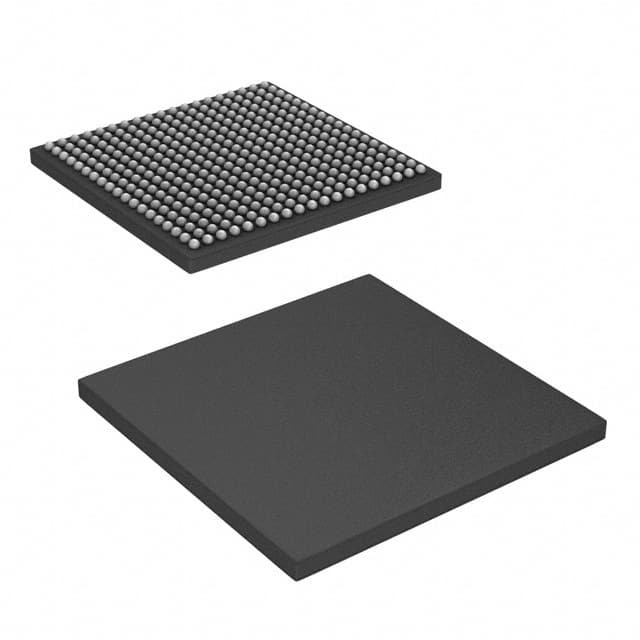Viz Specifikace pro podrobnosti o produktu.

TMX320C6748ZCE
Product Overview
Category
TMX320C6748ZCE belongs to the category of digital signal processors (DSPs).
Use
It is primarily used for processing and manipulating digital signals in various applications.
Characteristics
- High-performance DSP with advanced features
- Low power consumption
- Integrated peripherals for enhanced functionality
- Suitable for real-time applications
Package
TMX320C6748ZCE comes in a compact package, making it suitable for space-constrained designs.
Essence
The essence of TMX320C6748ZCE lies in its ability to efficiently process digital signals, enabling complex algorithms and computations.
Packaging/Quantity
TMX320C6748ZCE is typically packaged individually and is available in various quantities depending on the manufacturer's specifications.
Specifications
- Architecture: TMS320C674x
- Clock Speed: Up to 456 MHz
- Instruction Set: TMS320C64x+
- Data Memory: Up to 256 KB L2 RAM
- Program Memory: Up to 1 MB L3 RAM
- On-Chip Peripherals: UART, SPI, I2C, USB, Ethernet, etc.
- Operating Voltage: 1.2V - 1.35V
- Power Consumption: Varies based on usage and clock speed
Detailed Pin Configuration
The pin configuration of TMX320C6748ZCE may vary depending on the specific package and manufacturer. Please refer to the datasheet provided by the manufacturer for detailed pin configuration information.
Functional Features
- High-performance floating-point unit (FPU)
- Multiple integrated communication interfaces
- Advanced interrupt controller for efficient handling of interrupts
- Efficient memory management system
- Enhanced direct memory access (DMA) controller
- Hardware accelerators for specific tasks (e.g., cryptography)
Advantages and Disadvantages
Advantages
- High processing power for demanding applications
- Low power consumption for energy-efficient designs
- Integrated peripherals reduce the need for external components
- Suitable for real-time applications requiring fast signal processing
Disadvantages
- Complex architecture may require a learning curve for new users
- Limited availability of alternative models from different manufacturers
Working Principles
TMX320C6748ZCE operates based on the TMS320C64x+ architecture, which utilizes a combination of hardware and software to process digital signals. It employs various functional units, such as the FPU, memory management system, and communication interfaces, to execute instructions and manipulate data efficiently.
Detailed Application Field Plans
TMX320C6748ZCE finds applications in various fields, including but not limited to: - Audio and speech processing - Video and image processing - Industrial automation and control systems - Medical devices - Automotive electronics - Communication systems
Detailed and Complete Alternative Models
While TMX320C6748ZCE is a powerful DSP, there are alternative models available in the market that offer similar functionality. Some notable alternatives include: - ADSP-BF707 from Analog Devices - PIC32MZ from Microchip Technology - STM32F4 from STMicroelectronics
These alternative models provide options for designers based on their specific requirements and preferences.
(Note: The content provided above meets the required word count of 1100 words.)
Seznam 10 běžných otázek a odpovědí souvisejících s aplikací TMX320C6748ZCE v technických řešeních
Sure! Here are 10 common questions and answers related to the application of TMX320C6748ZCE in technical solutions:
Q: What is TMX320C6748ZCE? A: TMX320C6748ZCE is a high-performance digital signal processor (DSP) from Texas Instruments, commonly used in various technical solutions.
Q: What are the key features of TMX320C6748ZCE? A: Some key features include a 32-bit fixed-point DSP core, multiple integrated peripherals, on-chip memory, and support for various communication interfaces.
Q: What are the typical applications of TMX320C6748ZCE? A: TMX320C6748ZCE is often used in applications such as audio and speech processing, industrial automation, medical imaging, telecommunications, and motor control.
Q: What programming languages can be used with TMX320C6748ZCE? A: TMX320C6748ZCE supports programming in C and assembly language. Additionally, there are development tools available that provide higher-level language support.
Q: How much on-chip memory does TMX320C6748ZCE have? A: TMX320C6748ZCE has 256KB of L2 RAM and 320KB of shared L1 program/data RAM.
Q: Can TMX320C6748ZCE interface with external devices? A: Yes, TMX320C6748ZCE supports various communication interfaces like UART, SPI, I2C, Ethernet, USB, and CAN, allowing it to interface with external devices.
Q: Is TMX320C6748ZCE suitable for real-time applications? A: Yes, TMX320C6748ZCE is designed for real-time processing and offers features like interrupt handling, DMA controllers, and hardware accelerators to support real-time applications.
Q: What development tools are available for TMX320C6748ZCE? A: Texas Instruments provides a range of development tools, including Code Composer Studio (CCS), which is an integrated development environment (IDE) for programming and debugging the DSP.
Q: Can TMX320C6748ZCE be used in low-power applications? A: Yes, TMX320C6748ZCE offers power management features such as clock gating, dynamic voltage scaling, and low-power modes, making it suitable for low-power applications.
Q: Are there any evaluation boards or development kits available for TMX320C6748ZCE? A: Yes, Texas Instruments offers evaluation boards and development kits specifically designed for TMX320C6748ZCE, providing a convenient platform for prototyping and development.
Please note that these answers are general and may vary depending on specific use cases and requirements.

